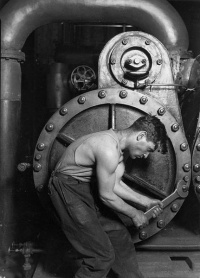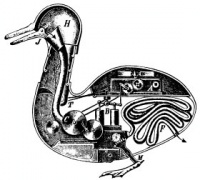Machine
From The Art and Popular Culture Encyclopedia
| Revision as of 21:24, 5 June 2008 Jahsonic (Talk | contribs) ← Previous diff |
Current revision Jahsonic (Talk | contribs) |
||
| Line 1: | Line 1: | ||
| + | [[Image:Mechanic.jpg|thumb|200px|left|"[[Powerhouse mechanic working on steam pump]]," 1920]] | ||
| + | {| class="toccolours" style="float: left; margin-left: 1em; margin-right: 2em; font-size: 85%; background:#c6dbf7; color:black; width:30em; max-width: 40%;" cellspacing="5" | ||
| + | | style="text-align: left;" | | ||
| + | "When people in the early [[seventeenth century]] talk of 'machines' they usually mean [[theatrical machines]]."--''[[Theatre of the World]]'' (1969) by Frances Yates | ||
| + | <hr> | ||
| + | "But I can see you!" she exclaimed. "What more do you want?"<br> | ||
| + | "I want to see you not through the [[Machine]]," said Kuno. "I want to speak to you not through the wearisome Machine."<br> | ||
| + | "Oh, hush!" said his mother, vaguely shocked. "You mustn"t say anything against the Machine."<br> | ||
| + | "Why not?"<br> | ||
| + | "One mustn"t."<br> | ||
| + | |||
| + | --"[[The Machine Stops]]" (1909) by E.M. Forster | ||
| + | |} | ||
| + | [[Image:Train wreck at Montparnasse 1895.jpg|thumb|right|200px|''[[Train wreck at Montparnasse]]'']] | ||
| + | [[Image:Duck of Vaucanson.jpg|thumb|200px|The '''''[[Canard Digérateur]]''''']] | ||
| + | [[Image:Homme machine (1747) - Julien Offray de La Mettrie.jpg|right|thumb|200px|''[[Man a Machine]]'' (1747) by Julien Offray de La Mettrie]] | ||
| {{Template}} | {{Template}} | ||
| - | # a [[mechanical]] or [[electrical]] device that performs or assists in the performance of human tasks, or is used for amusement (like a pinball machine). | + | A '''machine''' is a [[tool]] consisting of one or more parts that is constructed to achieve a particular [[goal]]. Machines are [[Work (physics)|powered]] devices, usually [[mechanic]]ally, chemically, thermally or electrically powered, and are frequently [[motor]]ized. Historically, a device required moving parts to classify as a machine; however, the advent of [[electronics|electronics technology]] has led to the development of devices without moving parts that are considered machines. |
| - | # the group that controls a political or similar organization. | + | |
| - | # {{archaic}} a vehicle operated mechanically; an [[automobile]]. | + | |
| - | # a person who seemingly acts like a machine, a person who is very [[proficient]] at a [[task]]. | + | |
| - | #: ''Bruce Campbell was a "demon-killing machine" because he made quick work of killing demons.'' | + | |
| - | == See also == | + | The word "machine" is derived from the [[Latin]] word ''machina'', which in turn derives from the [[Doric Greek]] ''μαχανά'' (machana), [[Ionic Greek]] ''μηχανή'' (mechane) "contrivance, machine, engine" and that from ''[[μῆχος]]'' (mechos), "means, expedient, remedy". The meaning of machine is traced by the Oxford English Dictionary to something that has been constructed. This includes human design into the meaning of machine. |
| - | The [[Machine Age]] | + | A [[simple machine]] is a device that simply transforms the direction or magnitude of a [[force]], but a large number of more complex machines exist. Examples include [[vehicle]]s, [[electronic system]]s, [[molecular machine]]s, [[computer]]s, [[television]] and [[radio]]. |
| + | |||
| + | == See also == | ||
| + | * [[All Watched Over by Machines of Loving Grace]] | ||
| + | * [[Animal machine]] | ||
| + | * ''[[The Machine Stops]]'' | ||
| + | * [[Darwin Among the Machines]] | ||
| + | * [[Desiring-production]] | ||
| + | * [[Ghost in the machine]] | ||
| + | * [[History of technology]] | ||
| + | * [[Human body]] | ||
| + | * [[Living machine]] | ||
| + | * [[Machine (band)]] | ||
| + | * [[Machine types and related components]] | ||
| + | * [[Machine Age]] | ||
| + | * [[Man machine]] | ||
| + | * [[Rube Goldberg machine]] | ||
| + | * [[Simple machine]] | ||
| + | * [[Technology]] | ||
| + | * [[Useless machine]] | ||
| {{GFDL}} | {{GFDL}} | ||
Current revision
|
"When people in the early seventeenth century talk of 'machines' they usually mean theatrical machines."--Theatre of the World (1969) by Frances Yates "But I can see you!" she exclaimed. "What more do you want?" --"The Machine Stops" (1909) by E.M. Forster |
_-_Julien_Offray_de_La_Mettrie.jpg)
|
Related e |
|
Featured: |
A machine is a tool consisting of one or more parts that is constructed to achieve a particular goal. Machines are powered devices, usually mechanically, chemically, thermally or electrically powered, and are frequently motorized. Historically, a device required moving parts to classify as a machine; however, the advent of electronics technology has led to the development of devices without moving parts that are considered machines.
The word "machine" is derived from the Latin word machina, which in turn derives from the Doric Greek μαχανά (machana), Ionic Greek μηχανή (mechane) "contrivance, machine, engine" and that from μῆχος (mechos), "means, expedient, remedy". The meaning of machine is traced by the Oxford English Dictionary to something that has been constructed. This includes human design into the meaning of machine.
A simple machine is a device that simply transforms the direction or magnitude of a force, but a large number of more complex machines exist. Examples include vehicles, electronic systems, molecular machines, computers, television and radio.
See also
- All Watched Over by Machines of Loving Grace
- Animal machine
- The Machine Stops
- Darwin Among the Machines
- Desiring-production
- Ghost in the machine
- History of technology
- Human body
- Living machine
- Machine (band)
- Machine types and related components
- Machine Age
- Man machine
- Rube Goldberg machine
- Simple machine
- Technology
- Useless machine




